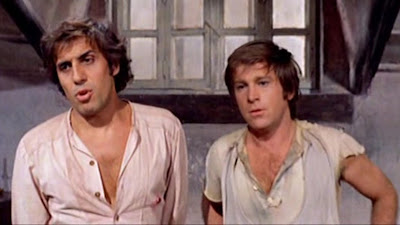MIFF billed this as Dario Argento's one comedy. That is to say his one film that isn't a bloodthirsty thriller or outright horror. The Festival has to come up with copy to entice punters and a cult director going against his own grain gets attention. But Argento is liberal with his comedy in all of his films, regardless of how scary or violent they get. Marcus and Daria in Deep Red (as well as Carlo's mum and her dotty conversation. The cat man in Bird With the Crystal Plumage which is a massive joke with a decent setup. Miss Tanner and Pavlos in Suspiria. Argento modelled himself on another master of suspense, Alfred Hitchcock who wasn't above a dark joke of his own. No, it's not the comedy that sets this one apart, it's the politics.
The flag gag at the beginning makes a good overture here with its con-job patriotism having an immediate effect on anyone who sees it. Cainazzo's response to this is spoilable but you can know that it is decisive and funny. While he is being schooled by a politico while walking and talking he can't even pronounce democracy let alone distinguish it from anarchy but he knows there must be something to it if people are willing to take a bullet for it.
More abstract is how he and Romulus the baker help a heavily pregnant woman give birth safely. There is a mix of approaches here including Chaplinesque sped-up slapstick and fun with the movie props of boiling water and hot towels etc. But then the baby is born safely, regardless of the chaos outside and the two go on their way without self congratulation. The Countess at the barricade made of her house's furniture (which she encourages) gets zapped by the effect the danger has on the machismo and invites all the citizen soldiers to her bed. There is a very clear indication of consent and the scene is a lot less about sexual favour than shows of benevolence from above and how fleeting that can be. Later, there is an attempted rape by contrast and it is prevented and, however inadvertently, punished. The pair's encounter with a widow falls somewhere between but ends up being the strangest episode of all.
Add the weird scene in the looted mansion where a denuded aristocrat schools them in cynical politics which puts him visually and philosophically more in Fellini's Satyricon than this era. What this and numerous other moments in this episodic film kept reminding me of was a strange kinship with the likes of Alejandro Jodorowski and his own clownish surrealism and hard violence. Argento is clearly interested in delineating this film from straight comedy, despite some scenes that play like nothing else. Some of the moments of street warfare throw cauldrons of ice water over that expectation.
The five days in Milan refers to a historical event, known to Italians readily. Some of those incidents are reproduced here and the rest is the swirling melee and chaos surrounding them. It's a starting point rather than a history lesson. If there is a problem it lies in the varying success of blending different forms of comedy and then them with the more severe details shown. A comedy would have everyone getting through. This one prefers to play it closer to likelihood. If there is laughter here it is that of the world when it doesn't like what it sees.

No comments:
Post a Comment